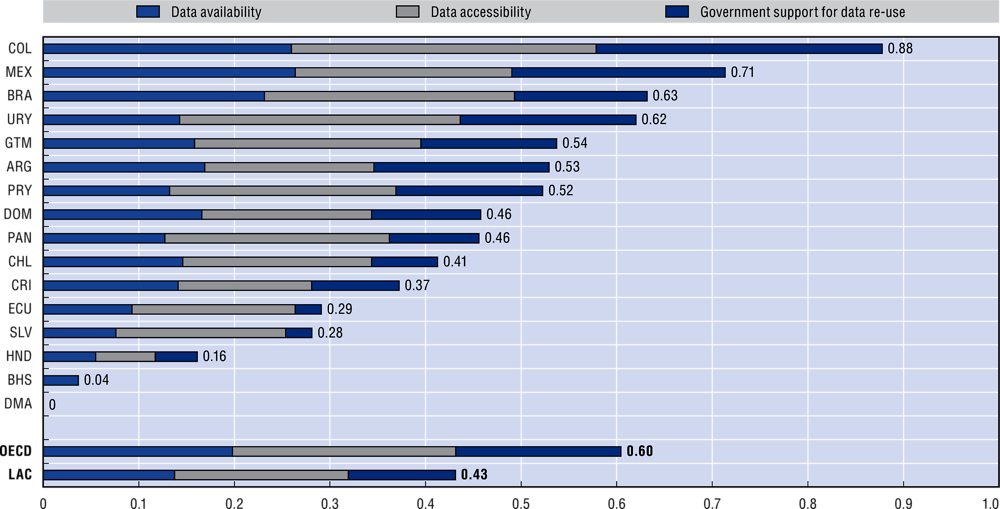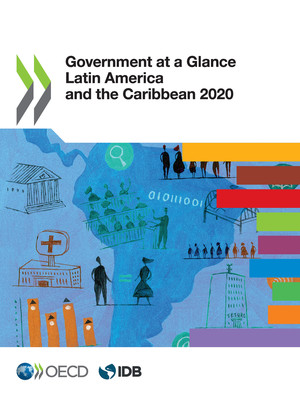copy the linklink copied!8.1. Open government data: Enabling policy maturity and sustainability
Governments across the globe have a great opportunity to generate public value by enabling the publication, sharing of and access to public sector data. Latin American and Caribbean (LAC) countries are highly committed to the open data agenda. The LAC region has the largest number of countries (11 in total) adopting the International Open Data Charter. In addition, 81% of LAC countries already have an appropriate medium-term strategy on open government data (OGD), compared to 84% of OECD countries, and 75% have a national OGD action plan that includes implementation of open data portals and the release of data.
More than half of the LAC countries that responded to the survey have a steering committee responsible for monitoring the implementation of the OGD policy at the central or federal level. In the vast majority of cases, such a committee involves stakeholders from public sector organisations, civil society and academia.
The Open, Useful and Re-usable data (OURdata) Index supports the development, implementation and impact of sound open data policies for OECD countries. For the first time, data from both LAC and OECD member countries can be compared using the final version of OURdata. The Index benchmarks the design and implementation of open government data policies. It ranges from 0 to 1, 0 being the lowest score and 1 the highest. It is composed of three indicators, which have an equal weight of 0.33: data availability, data accessibility and government support to the re-use. Each indicator ranges from 0 to 0.33.
On average, LAC countries scored 0.43, in comparison to an OECD average of 0.60 in 2019. There is a stark contrast on development levels of the LAC region in OGD. Colombia (0.88), Mexico (0.71) and Brazil (0.63) lead in the region having higher scores than the OECD average (0.60). However, Caribbean countries such as the Bahamas (0.04) and Dominica (0.00) are not yet implementing OGD policies as measured by OURdata.
Data availability refers to the policy frameworks that regulate the release of government data. Both Colombia and Mexico rank first on this dimension (0.26), followed by Brazil (0.23), Argentina and Dominican Republic (0.17). Data accessibility measures how OGD are released (e.g. in machine-readable formats). It is the component of the OURdata index where LAC countries score the highest. For instance, the regional average for data availability is 0.14 (compared to an OECD average of 0.20) while that of data accessibility is 0.18 (compared to 0.23). Additionally, while Ecuador and El Salvador score below average on data availability (0.09 and 0.08 respectively), they score in line with the LAC average on data accessibility (0.17 and 0.18 respectively).
Government support for data re-use measures the efforts to encourage stakeholders from the government and the civil society to use OGD. LAC countries scored an average of 0.11, compared to 0.17 for the OECD. In this aspect, the region needs to intensify its efforts to support the re-use of OGD.
OGD are government data released without any technical and legal barriers and, if possible, free of charge. This allow them to be freely used, reused and redistributed by anyone, anytime and anywhere. Government data include, but are not limited to, those held by national, regional, local and city governments.
Data for the OURdata Index were collected through the OECD Open Government Data Survey, with the support of the IDB. Sixteen LAC member countries responded to the 2019 survey. Respondents where predominantly senior government department officials in charge of digital and open government policies. Data refer only to central/federal governments and exclude practices at the state/local level.
The composite OURdata Index is based on the OECD analytical methodology described by Lafortune and Ubaldi (2018), which also maps the principles of the International Open Data Charter. It consists of three indicators: Data availability, Data accessibility and Government support for data re-use. The score for each indicator corresponds to an unweighted simple average of each sub-indicator The Index does not measure the impact of open government data on socio-economic outcomes, but rather the work governments do to provide sufficient conditions to enable and stimulate their re-use.
For more information on the methodology and underlying data, see Annex D.
Further reading
Lafortune, G. and B. Ubaldi (2018), “OECD 2017 OURdata Index: Methodology and results”, OECD Working Papers on Public Governance, No. 30, OECD Publishing, Paris, https://doi.org/10.1787/2807d3c8-en
Muente, A. and F. Serale (2018), Los datos abiertos en América Latina y el Caribe, Inter-American Development Bank, Washington, DC, https://doi.org/10.18235/0001202]
Figure notes
Data for Argentina, Chile, Colombia and Mexico were collected through the 2018 OECD Open Government Data Survey. Honduras established a central OGD portal in mid-2019, after the survey was conducted. In Brazil, since July 2019, the office of the comptroller general is responsible for OGD policies, and therefore, there have been some changes in implementation.
8.1 For explanations of the acronyms, please see StatLink. In 2019, when drafting its 4th Open government plan, public sector organisations of Mexico had an active role in the steering group.
Metadata, Legal and Rights
https://doi.org/10.1787/13130fbb-en
© OECD 2020
The use of this work, whether digital or print, is governed by the Terms and Conditions to be found at http://www.oecd.org/termsandconditions.



